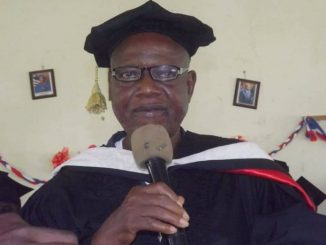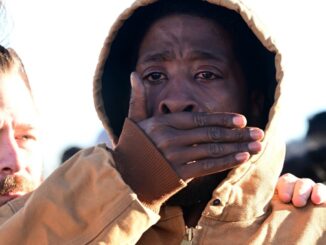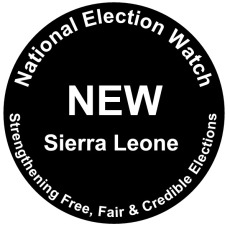
The launch and commissioning of a 24-hour solar powered electrical system at Mambolo Community Health Centre (CHC) on 3rd April, by the Minister of Energy, Ambassador Henry Macauley, is the first step in a major solar energy initiative which will bring power to 50 CHCs around the country before July 2017, contributing to better community health, safer childbirth and improved childhood survival.
The initiative supports the President’s Recovery Priorities’ plan to bring 24-hour light to 50 Community Health Centres (CHCs) by equipping them with solar photovoltaic (sPV) systems in the range of 6kWp per system. These will power lights, fridges for vaccines, water pumps and plug sockets in all rooms.
The electrification of the CHCs is the first stage in the Ministry of Energy’s ambitious Rural Renewable Energy Project (RREP), in partnership with the British Government through UK AID. In the next phase, the solar power generation facilities installed at the CHCs will be extended to include small mini-grids. These will be operated by private operators with commercial interests or local community associations, both ensuring long term sustainability.
Looking forward to the third phase, a further 40 mini-grids will be installed in rural locations. These will be larger and are designed to be installed in communities where household and private sector demand will ensure they can become profitable business ventures. All phases of the RREP will be completed by October 2020, benefitting around 500,000 people.
The RREP was conceived by Ambassador Henry Macauley in response to President Ernest Bai Koroma’s commitment to increasing the number of rural communities across Sierra Leone with electricity.
Speaking at the launch, Ambassador Henry Macauley explained that the Ministry of Energy was working closely with the Ministry of Health to ensure that stage one of the RREP – the electrification of the CHCs – would meet the President’s Recovery Priorities deadline this 2017. He added: “Electrification is essential for our nation’s development. Today is just the start of a project that will have widespread health, economic and educational benefits. As the project rolls out, we will incorporate schools, other institutions and homes. Families will be healthier, women will have safer pregnancies, children will be able to do their homework and new businesses opportunities will be created.”
Guy Warrington, British High Commissioner to Sierra Leone has lauded this initiative stating “Sierra Leone can be proud that it was the first country to sign an Energy Africa compact with the UK establishing our common goals. I am delighted that UK Aid [has in this project pledged] £34.5 million to improve rural electrification in support of the Government of Sierra Leone’s efforts to improve energy access for rural communities as part of our £240 million commitment to the recovery.”
UNOPS is the agency contracted to implement the project. At the launch, Nick Gardner, the UNOPS Project Director said: “We are at the beginning of a four-year programme which will provide electricity in up to 100 villages across the country, by creating solar power stations which will connect power to the health centre, schools, businesses and homes. The first phase is aimed at the priority of health facilities and will provide power to 54 health centres nationwide.”
The second of the mini-grids was launched the following day in Kambia District’s Kukuna Village. At the launch, Paramount Chief Kandeh Kabba Sebu Bramaia said: “This is happiest day of my life. When I was initially given the news, I couldn’t sleep with joy. For many of us here, it will take time to understand what this means to our community, but some of us already understand the benefits the solar mini-grid will bring to Kukuna. We will always remember what you brought here today.”
Over the next seven days, the Minister of Energy will launch solar electrification projects at Community Health Centres in Kenema District and Koinadugu.
###
About DFID: The Department for International Development (DFID), known as ‘UK Aid,’ leads the UK’s work to end extreme poverty, building a safer, healthier, more prosperous world for all of us, which is firmly in the UK’s national interest. We’re ending the need for aid by creating jobs, unlocking the potential of girls and women and helping to save lives when humanitarian emergencies hit. For more information about DFID, visit: https://www.gov.uk/…/department-for-international-dev…/about
About UNOPS: UNOPS mission is to help people build better lives and countries achieve sustainable development. Our vision is a world where people can live full lives supported by appropriate, sustainable and resilient infrastructure and by the efficient, transparent use of public resources in procurement and project management. For more information about UNOPS, visit: www.unops.org.
For more information, please contact:
– Ministry of Energy – PR Officer, Fonike Ahmed : +232 76 78 37 62
– Presidential Delivery Team (Energy) energy.cdt@gmail.com: +232 76 67 66 07
– Cheryl Haines, UNOPS Communications Specialist, CherylH@unops.org




